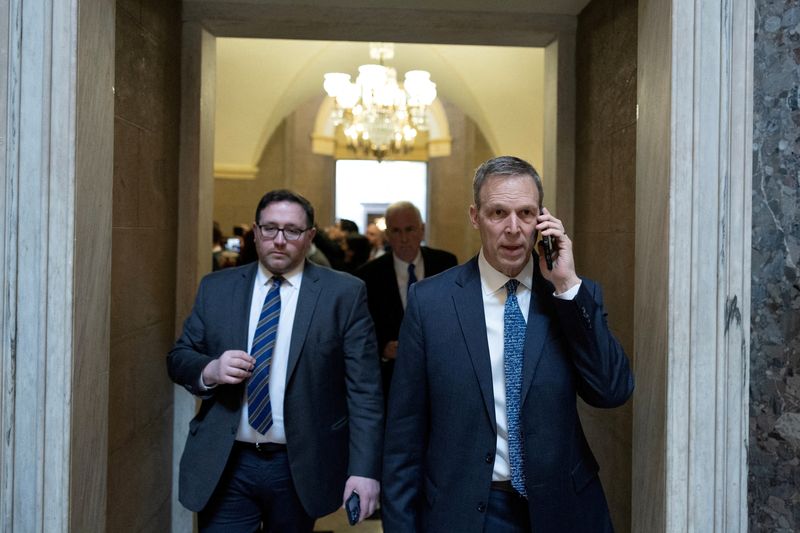By David Morgan
WASHINGTON (Reuters) - The hardline U.S. House Freedom Caucus responded to President Joe Biden's $6.8 trillion budget proposal on Friday, with a list of demands including a near freeze on discretionary spending and an end to multiple programs, in exchange for raising the debt ceiling.
The caucus of at least 37 members, which can stymie legislation in the narrowly divided House of Representatives, issued a position paper that would keep defense spending flat and reset nondefense discretionary spending at pre-COVID-19 pandemic levels while holding annual spending growth to 1%.
Biden's proposal and the hardline response are just early salvos in a budget negotiation that has higher-than-usual stakes because House Republicans have said they will not vote to lift the nation's $31.4 trillion debt ceiling unless Biden agrees to spending cuts.
With the Senate narrowly controlled by Biden's Democrats and the House narrowly held by Republicans, neither proposal is likely to pass unaltered.
Dubbed "Shrink Washington, Grow America," the plan also calls for ending Biden's student loan forgiveness program, rescinding unspent COVID-19 relief funding and recouping $80 billion allocated by Congress last year for the Internal Revenue Service.
House Freedom Caucus Chairman Scott Perry said the plan would mean a $131 billion spending cut for fiscal 2024, which begins on Oct. 1, and save $3 trillion over a decade.
The plan, which parallels some of the priorities being pursued by House Budget Committee Chairman Jodey Arrington, comes amid a standoff over the $31.4 trillion debt ceiling that has raised concerns about a political standoff between Biden and House Republicans that could lead to the nation's first-ever default.
The House Freedom Caucus, whose members forced House Speaker Kevin McCarthy to endure 15 floor votes before being elected to his top post, is among a number of congressional groups hoping to influence the budget that Arrington's panel is due to produce in coming weeks.
"America will not default on our debts unless President Biden chooses to do so," Perry told reporters at a news conference. "To ensure America does not default on our debts, the House Freedom Caucus is offering a responsible solution."
On Thursday, Biden unveiled a budget that would cut deficits by nearly $3 trillion over 10 years by raising taxes on those earning more than $400,000 a year. It would also increase federal spending in 2024 to $6.8 trillion from the $6.2 trillion expected to be spent in the current fiscal year.
"To president Biden: your budget is dead on arrival," said Representative Byron Donalds, a House Freedom Caucus member.
Biden said the Freedom Caucus wants to retain $2 trillion in tax cuts enacted under former President Donald Trump, without imposing new tax levies on the wealthy. "And in addition to that, on top of that, they're going to say we have to cut 25% of every program across the board," Biden said. "I don't know (that) there's much to negotiate on."
A House presentation on U.S. fiscal health by the nonpartisan Congressional Budget Office this week laid out 17 deficit-reduction options including several that contained either new or higher taxes.

Those with the biggest deficit-reducing potential were new consumption and payroll taxes, and new limits on tax deductions, each of which could cut the deficit by as much as $2.3 trillion-$3 trillion over a decade.
Spending cuts would have significantly less impact, the CBO said, according to a copy of its presentation posted online.